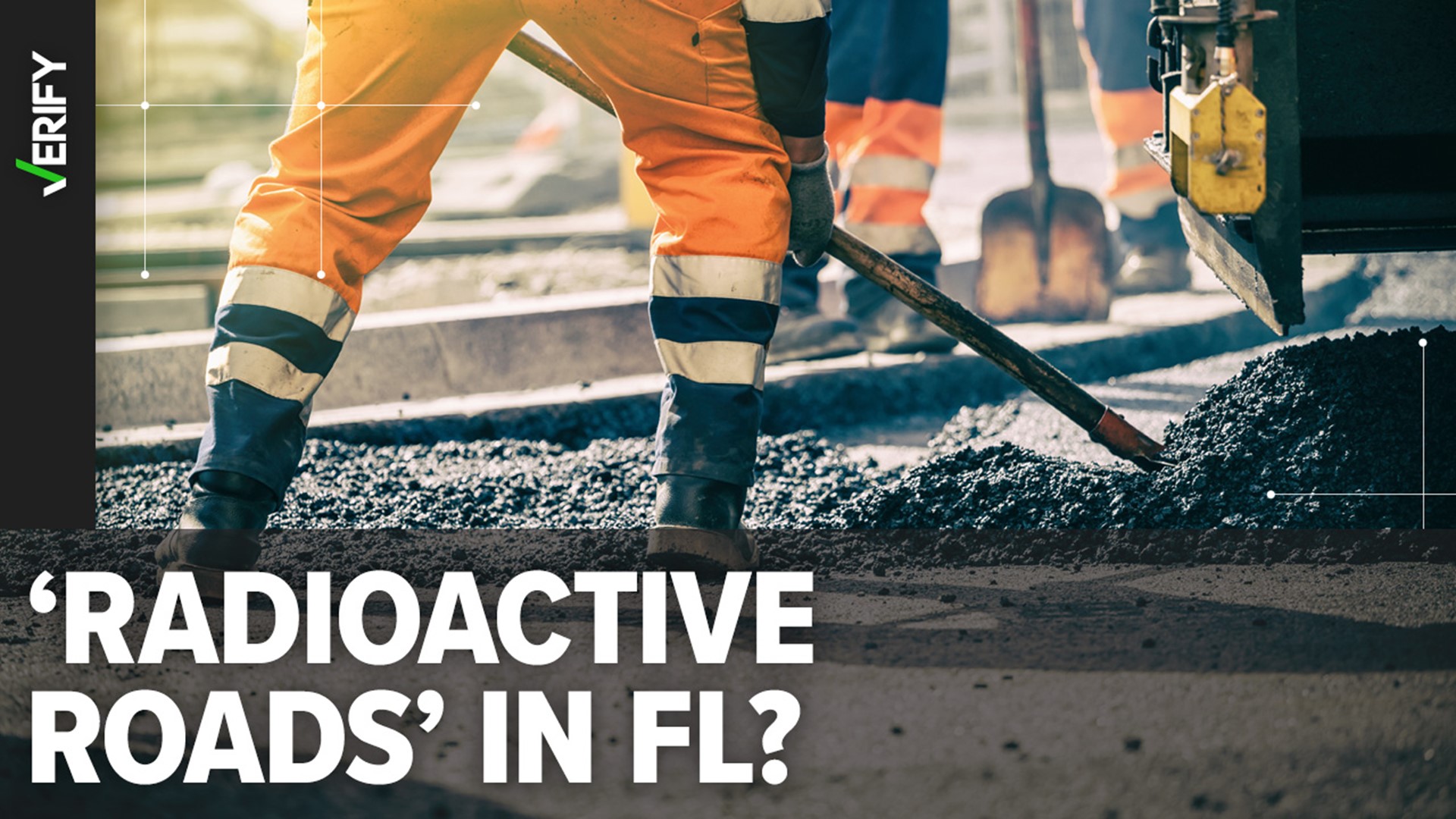On June 29, Florida Gov. Ron DeSantis, who is also running for president in 2024, signed a law that would change the allowable ingredients state officials can study to determine if they can be used to build roads.
Phosphogypsum was added to the list of “recyclable materials” that can undergo feasibility studies to determine if it can be used in road construction, according to the law.
Online, people have said this law will make roads radioactive in Florida, with some headlines claiming this bill allows radioactive waste to be used in roads. VERIFY viewer Tammy emailed to ask if the new law signed by DeSantis allows for radioactive waste to be used to build roads.
THE CLAIM
A Florida law allows for radioactive waste to be used in road construction.
THE SOURCES
THE ANSWER
The Florida law doesn’t say Florida can start using radioactive waste in roads. It allows for Florida’s Department of Transportation to study phosphogypsum to determine if it can be used in road construction. The state will also have to apply for EPA approval before it can be used.
WHAT WE FOUND
The Florida law signed by DeSantis paves the way for the phosphogypsum to become available to road construction crews, but there is a process that must be followed first.
Before we talk about the process, here is what we know about phosphogypsum.
Phosphogypsum is a material that is left behind from mining phosphate rock, according to the EPA.
Phosphate rock is used to create fertilizer and contains small amounts of uranium and radium. When phosphate rock is processed to make fertilizer, the phosphorus is removed by dissolving the rock in an acidic solution.
The waste that is left behind is phosphogypsum. Most of the naturally occurring uranium, thorium and radium found in phosphate rock ends up in this waste, the EPA says. Uranium and thorium decay to radium, and radium decays to radon, a radioactive gas. Because the wastes are concentrated, phosphogypsum is more radioactive than the original phosphate rock.
Since 1989, the EPA has required phosphogypsum to be stored in piles called “stacks,” and limited the amount of radon gas that can be emitted from the stacks.
The law signed by DeSantis doesn’t say this radioactive material can be used immediately in road construction, but it does give the Department of Transportation (DOT) the authority to study it as a potential recyclable material that can be used to pave roads.
First, the DOT has to conduct "demonstration projects using phosphogypsum in road construction aggregate material" as it studies the usefulness of the material as a paving material. The DOT has until April 1, 2024 to provide its findings on the suitability of using the material for roads.
If the DOT finds it is a suitable option as a road material, and it may be used in accordance with conditions set by the EPA, then the state will apply for approval with the EPA for phosphogypsum to be used.
The EPA will then have to approve or deny it to be used for roads.
In 2020, the EPA conditionally approved the use of phosphogypsum in government road construction projects at the request of The Fertilizer Institute. But, in 2021, the EPA withdrew that approval after environmental and public health groups petitioned the EPA to reconsider the approval.
In the petition to the EPA, critics argued removal from the stacks – which would have to happen in order for phosphogypsum to be used in roads – could cause radioactive material to leak into the environment, causing harm to humans and the environment.
In a statement published in July 2021, after the EPA withdrew approval, the Center for Biological Diversity said when the EPA approved phosphogypsum use in roads, the agency “ignored its own expert consultant, who found numerous scenarios that would expose the public — particularly road-construction workers — to a cancer risk the agency considers to be unacceptably dangerous.”
Under this law, phosphogypsum would join this list of other recyclable materials that can currently be reviewed for road use in the state of Florida:
- Ground rubber from automobile tires
- Ash residue from coal combustion byproducts
- Recycled mixed-plastic material for guardrail posts or 40 right-of-way fence posts
- Construction steel, including reinforcing rods and beams, manufactured from scrap metals disposed of in the state
- Glass, and glass aggregates
VERIFY reached out to Florida’s Department of Transportation and DeSantis’ office for comment and did not hear back at the time of publication.

